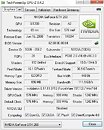- Joined
- Oct 9, 2007
- Messages
- 47,438 (7.50/day)
- Location
- Hyderabad, India
| System Name | RBMK-1000 |
|---|---|
| Processor | AMD Ryzen 7 5700G |
| Motherboard | ASUS ROG Strix B450-E Gaming |
| Cooling | DeepCool Gammax L240 V2 |
| Memory | 2x 8GB G.Skill Sniper X |
| Video Card(s) | Palit GeForce RTX 2080 SUPER GameRock |
| Storage | Western Digital Black NVMe 512GB |
| Display(s) | BenQ 1440p 60 Hz 27-inch |
| Case | Corsair Carbide 100R |
| Audio Device(s) | ASUS SupremeFX S1220A |
| Power Supply | Cooler Master MWE Gold 650W |
| Mouse | ASUS ROG Strix Impact |
| Keyboard | Gamdias Hermes E2 |
| Software | Windows 11 Pro |
TechPowerUp today released version 0.4.2 of the GPU-Z graphics subsystem information and monitoring utility. This release comes quicker than its typically one-month development cycle, as it fixes some important issues. Version 0.4.2 resolves an issue with some NVIDIA GeForce graphics cards where GPU-Z may affect fan-speed control. It fixes a rare crash on MSI R5830 Twin Frozr II graphics card, and reverts to its old method of calculating graphics card memory bandwidth which caused some confusion among the enthusiast community. The ongoing Hardware Giveaway stays, giving you a chance to win some groovy ASUS Republic of Gamers series graphics cards and motherboards.

DOWNLOAD: TechPowerUp GPU-Z 0.4.2
A complete list of changes (changelog) follows.
View at TechPowerUp Main Site

DOWNLOAD: TechPowerUp GPU-Z 0.4.2
A complete list of changes (changelog) follows.
- Fixed an issue on all NVIDIA cards that would sometimes cause them to lose fan control when GPU-Z is running. Please don't run pre-0.4.2 and 0.4.2 at the same time, this might result in incorrect readings in the 0.4.1 window.
- Fixed system crash on MSI HD 5830 TwinFrozr II
- Validation upload now uses Unicode for entered name
- Reverted memory bandwidth calculation introduced in last version. It introduces too much confusion, we will go with what all companies use in their marketing material, even though we believe it is not correct. Using power of 10 again now, 1 GB/s = 1,000,000,000 Bytes per Second.
View at TechPowerUp Main Site









